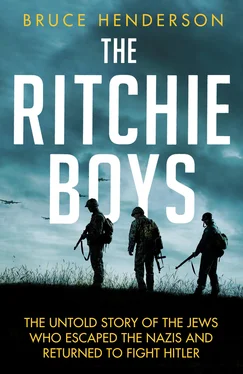Only now did Martin allow himself to believe he was out of danger. At the border, he had been dead certain he and the others were about to be taken into custody. Since his arrest on November 10, 1938, he had been trapped in an unending nightmare. His release from Dachau had not relieved the tension and anxiety he felt living in the country he had once thought of as his homeland. But now that he had finally made it out of Nazi Germany, he was both relieved and exhausted.
Mesmerized by the clickety-clacking of the tracks, his body went limp. He fell into a stupor, the deepest sleep he had enjoyed in months. He stayed sprawled across the seat until the conductor gently shook him awake; the man wanted to know, strangely, whether he was all right.
“I am now,” said a groggy Martin, who then went back to sleep.
Growing up in Berlin, Werner Angress often wondered why he was blond and blue eyed and the other Jewish boys were not. And why did he do well in athletics but not academics, like so many of them?
Born in 1920, Werner was the oldest of three boys. His brother Fritz was younger by three years, and Hans by eight. His parents, Ernst and Henny Angress, were third-generation Berliners whose forebears had been bourgeois Prussians. They had married relatively late, at thirty-six and twenty-seven, respectively, and were solidly middle class with little formal education. In other ways, they were a study in contrasts. Henny was outgoing and fun to be around. She loved to give parties, dance the polka, and sing Schubert songs at the grand piano in their apartment. A brunette with dark brown eyes, she was always well dressed and coiffed. In contrast, Ernst was balding and rotund, the managing director of a bank. He favored conservative three-piece suits and was a conscientious businessman who espoused Old World virtues and demanded precise accounting, even of household expenditures. Though he could be upset by something as small as the cost of dinner ingredients, he was incapable of denying his attractive wife a new dress or sweater.
At the same time, he managed to teach his sons the value of money. When Werner was ten years old, he asked what it meant to be Prussian. His father didn’t hesitate. Responsibility, he told his son. Honor. Thrift.
For young Werner, who wanted so much to please his father by striving for those upstanding qualities, meeting them in his schoolwork did not come easily. Though he earned high marks in reading, writing, and gymnastics—even leading his school squad to a regional championship—he earned Ds and Fs in geometry, algebra, physics, and chemistry. In middle school, he was barely promoted to the next grade, and his parents received a letter warning that he would have to repeat eighth grade if his work didn’t improve.
Going to school became even more uncomfortable for Werner after January 30, 1933. On that cold, rainy Monday, he rode his bicycle home past the newsstand at the Botanical Garden train station and saw blaring headlines announcing that Hitler had been appointed chancellor. On the same day, three hundred miles away in the hamlet of Josbach, Manfred Steinfeld was hearing the “wonderful” news from the physician treating his sick grandmother.
When Werner reached the apartment, he was surprised to see his father home early from work. A friend of his father’s was visiting, and both men, along with Werner’s mother, were in the living room, cracking jokes about Hitler.
“Hitler was running back and forth in the state chancery opening all the desk drawers and cabinets,” said Werner’s father. “When asked what he was looking for, Hitler answered, ‘My government program.’ ”
Ernst added confidently, “He won’t last two weeks,” expressing a point of view about Hitler that many Germans held at that time.
His mother said she had heard a good one at the fish store. “Know what a Hitler herring is? You take a herring, remove its brain, tear its mouth wide open, and you have a Hitler herring.”
This was the last time Werner heard his parents joke about Hitler.
When Werner stepped into the room, his father asked how the kids at school had reacted to the news. Werner said they had not known before school let out. Uninterested in any further discussion of politics, he went to his room.
The next day at school, Werner could feel the tension as soon as he walked into the classroom. His teacher hadn’t shown up yet, and in his place at the podium was one of the students in his Hitler Youth uniform. When the boy spotted Werner, he instructed the class to shout in unison, “Wake up, Germany! Death to the Jews!” He received a round of applause.
Werner felt the eyes of his classmates following him as he took his seat, his knees suddenly wobbly, a red-hot blush spreading across his face. With his blond hair and blue eyes, he was accustomed to not being identified as Jewish, and to be singled out was extremely uncomfortable. Like everyone else, he raised his arm to give the obligatory German salute and shout “Heil Hitler!” at the beginning of each class. None of his classmates had ever commented about his doing so; in fact, Werner knew, not doing so would make him a spectacle.
When the twenty-four-hour boycott of Jewish-owned businesses was staged two months later, Werner’s mother made a point of shopping at a Jewish sewing store for items she didn’t really need. She brought Werner with her, and they passed SA brownshirts taking photos of anyone entering the store. Inside, Henny found a packet of needles and Werner picked out a spool of thread. They left, his mother holding her head high, Werner beside her, hoping none of his friends had seen him in a ladies’ sewing store.
Later, out of sheer curiosity, Werner went downtown to watch a large Nazi rally. At first, he couldn’t see over the crowd—he was a thirteen-year-old boy among adults—but the next thing he knew a helpful bystander had hoisted him up several rungs of a ladder. From his perch, he easily saw to the front of the rally, where uniformed Nazis were waving torches and flags. He heard their amplified voices yelling hateful slogans, each of which was loudly cheered by the enthusiastic crowd.
“A bunch of dirty Jews!”
“Throw them out of our Fatherland!”
“Send them off to Jerusalem, but first cut off their legs so they can’t come back!”
Werner climbed down from the ladder and headed home.
On the first Yom Kippur after the Nazis’ ascent to power, Werner went with his parents to synagogue, which he had attended since age ten. As the worshippers made their way toward the tall, imposing temple, uniformed storm troopers crowded the sidewalks, shouting catcalls and insults as the Jews walked past. Tucked between his mother and father, Werner was frightened not only by the Nazis but by the fear he saw etched on the faces of his parents and the other Jews who walked with them.
At the synagogue, Werner followed his parents to their seats. Soon he would become a bar mitzvah in this same temple, although he had yet to learn the short prayer he had to recite, let alone the passage he was to read in Hebrew from the Torah.
That night, two Nazis sat behind the congregation to monitor the sermon. The young rabbi, Dr. Manfred Swarsensky, spoke explicitly about the political turmoil taking place across Germany. Condemning the outrages being committed daily by the Nazis, he quoted, in conclusion, the New Testament and the dying words of Christ on the crucifix.
“Lord, forgive them, for they know not what they do.”
Nearly everyone in the congregation was weeping. Werner kept a steady gaze on the rabbi, this holy man who had dared to speak up publicly before the Nazis when so many others remained silent. Werner knew he was hearing something special from a very brave man. He watched to see if the young rabbi was arrested by the two Nazis after his sermon, but to the boy’s relief he wasn’t.
Читать дальше












